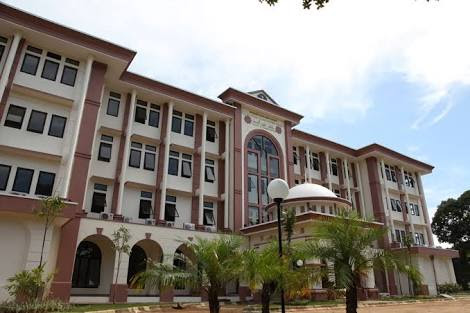VALIDITY OF TEACHING MATERIALS BASED ON PROBLEM BASED LEARNING IN BASIC STATISTICS COURSE IN GRAPHICS ENGINEERING STUDENTS
VALIDITAS BAHAN AJAR BERBASIS PROBLEM-BASED LEARNING UNTUK PEMBELAJARAN STATISTIKA DASAR BAGI MAHASISWA TEKNIK GRAFIS
Abstract
This research aims to determine the validity of the problem-based learning module teaching materials in the basic statistics course for graphic engineering students at the State Polytechnic of Creative Media PSDKU Makassar. The type of research used is research and development concerning the 4D development model. The 4D development model consists of several phases: define, design, develop, and disseminate. The product developed is module teaching materials based on problem-based learning on basic statistics material. The test subjects in this research were graphic engineering students at the State Polytechnic of Creative Media PSDKU Makassar. The instrument used in this research was a validation sheet consisting of two validators from design experts and material experts. Based on the results of the research that has been carried out, it is obtained that the analysis of the validation results: (1) the feasibility of the graphic, namely 4.8 is in the very valid category, (2) the feasibility of the language, which is 4.8, is in the very valid category, (3) the feasibility of the content is 4.8 in the very valid category, and (4) the feasibility of presenting that is 4.8, is in the very valid category so that the average value of all aspects is 4.7 which is in the very valid category. So, the problem-based learning module teaching materials in basic statistics courses that have been developed are valid to be used as teaching materials in the learning process.
Downloads
References
Ainun, A. M. (2019). Development of maple-assisted software teaching materials in the calculus i course majoring in mathematics education, tarbiyah architecture, and teacher training at uin alauddin makassar. [Thesis]. Alauddin State Islamic University of Makassar.
Akbar, S. (2013). Instrument perangkat pembelajaran. Bandung: PT Remaja Rosdakarya.
Alfiantara, A. (2016). Development of problem-based learning oriented modules assisted by android applications. Journal Of Chemistry Education Innovation, 10(2), 1769-1777. https://doi.org/10.15294/jipk.v10i2.9530.
Atkinson, R., Richard, & Hilgard, E. R. (2011). Introduction to psychology. Jakarta: Erlangga.
Bakhtiar, A. (2004). Science phylosophy. Jakarta: Raja Grafindo Persada.
Daryanto. (2013). Preparing modules (teaching materials for teacher preparation in teaching). Yogyakarta: Gava Media.
Lestari, F. (2021). Development of problem based learning mathematics teaching materials for elementary school students. Journal Basicedu, 5(1), 395–405. Retrieved from https://jbasic.org/index.php/basicedu.
Lestari, & Surya. (2017). The effectiveness of realistic mathematics education approach on ability of students’ mathematical concept understanding. International Journal of Sciences, 34(1), 91–100. Retrieved from http://gssrr.org/index.php?journal=JournalOfBasicAndApplied.
Murtikusuma, & Pratama, R. (2015). Development of mathematics learning devices problem-based learning model assisted by powerpoint media for class XI vocational high school students with lines and series materials. Journal Saintifika, 17(2), 20-33. Retrieved from https://jurnal.unej.ac.id/index.php/STF/article/view/2733.
Nugroho, N. B. (2014). Development of lesson plans and worksheets based on problem-based learning on set materials for class VII students. [Thesis]. Yogyakarta State University.
Nurhidayanti, S. (2017). Development of problem-based mathematics teaching materials to facilitate the achievement of reasoning ability on comparative subjects for class VII MTSN Makassar Model. [Thesis]. Alauddin State Islamic University of Makassar.
Prastowo. (2011). Creative guide to making innovative teaching materials. Yogyakarta: Diva Press.
Purnomo, D. (2011). Development of mathematics teaching materials as a means of developing creative thinking. AXIOMA : Journal of Mathematics and Mathematics Education, 2(1), 1. https://doi.org/10.26877/aks.v2i1/ Maret.43.
Rahmayani, S., & Hendriana, H. (2021). The validity of teaching materials based on problem based learning approach on statistics materials. Jurnal Pembelajaran Matematika Inovatif, 4(4), 869–870. https://doi.org/10.22460/jpmi.v4i4.867-874.
Refnywidialistuti. (2021). Validity of teaching materials using problem-based learning oriented pakem. Mathematics Paedagogic, 6(1), 1–8. https://doi.org/10.36294/jmp.v6i1.1877.
Sagala, Umar, Thahir, Saregar, & Wardani. (2019). The effectiveness of stem-based on gender differences: the impact of physics concept understanding. European Journal of Educational Research 8(3), 753-761. https://doi.org/10.12973/eu-jer.8.3.753.
Sitepu. (2015). Textbook writing lessons. Bandung: PT Remaja Rosdakarya.
Sudjana, N. (2009). Assessment of the results of the teaching and learning process. Bandung: Remaja Rosdakasya.
Sugiono. (2009). Educational research methods (quantitative, qualitative, & R&D). Bandung: Alfabeta.
Syamsidah, & Suryani, H. (2018). Problem based learning model (PBL). Yogyakarta: Deepublish.
Yakub, R. D. (2019). Development of contextual-based mathematics learning devices on two-variable linear equation system materials for class VIII SMP/MTs. [Thesis]. Alauddin State Islamic University of Makassar.
Yusuf, M. (2018). Introduction to education. Lembaga Penerbit Kampus IAIN Palopo. Jakarta: Kultura.
Copyright (c) 2022 Fitriani Halik, Lukytta Gusti Acfira, Besse Irna Tawaddud

This work is licensed under a Creative Commons Attribution 4.0 International License.

